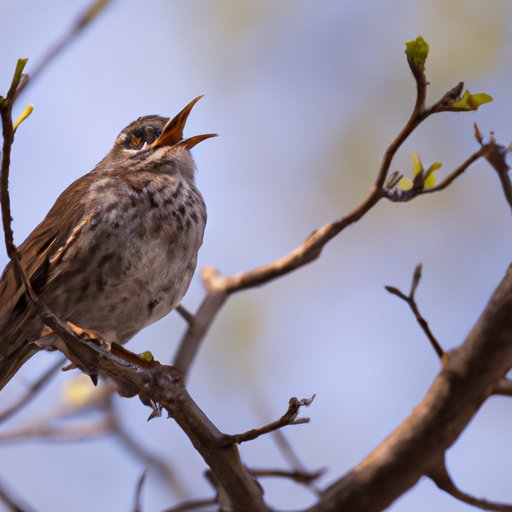Introduction
There is something quite special about the sound of birds chirping. Whether it’s the light chirp of a sparrow or the sing-song melody of a thrush, these beautiful sounds contribute to the music of the natural world. But why do birds chirp? In this article, we will explore the different reasons why birds express themselves through chirps and tweets, and how this connects to human culture and experience.
The Biological Importance of Bird Chirping in Nature
Bird chirping has significant biological importance in nature, contributing to the food chain and mating rituals. Birds are able to use their songs in a variety of ways, from attracting a mate to warning of danger. For example, the mating calls of certain bird species are particularly unique and complex, playing a crucial role in successful courtship.
Birds also use chirping to establish their territory and defend their nests and young. Different species of birds have different songs that communicate their presence to other birds in their habitat, letting them know where they are and when they intend to mate and breed. Some birds use specific chirps to communicate among their flock and coordinate activities such as foraging for food or evading predators.
How Language-Learning Parallels Birdsong
Many species of birds have complex songs that can change and evolve over time. Like learning a language, birds learn their songs through a process of imitation and practice. Some birds even have certain songs unique to their local geography, similar to accents in human language.
Interestingly, the process of bird learning and song sharing is also similar to human infant language acquisition. In both cases, there is a window of time in which the individual must be exposed to the new sounds in order to acquire them.
The Connection Between Bird Chirping and the Seasons
It’s well known that bird chirping can differ greatly depending on the time of year. In the spring, many birds begin singing as a way of signaling their fitness as a mate. During the summer, some birds chirp less frequently to conserve energy, while other birds, such as migratory species, may become completely silent during their travels.
During the fall, many birds begin to migrate to warmer climates, while others remain behind to store food and prepare for the winter. In the winter, bird chirping is greatly reduced as birds focus on finding shelter and food to survive the harsh weather conditions.
The Cultural Significance of Bird Chirping Across the Globe
Bird chirping has always fascinated humans, and it has entered into art, poetry, literature, and mythology in various cultures around the globe. In many cultures, birds are symbols of freedom, hope, and the spirit of nature. In some cultures, certain birds are viewed as messengers or even gods. In more practical terms, bird chirping has been used in hunting and fishing practices, as well as in preparation for crops such as tea.
Each culture has their unique understanding of bird chirping and what it signifies. For example, in ancient Greece, birds were thought to be able to predict the future based on the sounds they made. Meanwhile, in Native American Hopi culture, Katsinam (spirits) would come to bestow blessings upon hearing the arrival of migratory birds.
Birdsong as a Tool for Relaxation and Meditation
It’s not just culture and biology that make bird chirping special. It has been found that the sound of birds can actually have a relaxing effect on humans. Listening to birds can even reduce stress and contribute to a sense of wellbeing. This is why many people use bird chirping as a form of meditation and relaxation, and why it’s common to hear birds chirping recordings in spas, yoga studios, and meditation centers.
Researchers believe that the reason that bird chirping has a calming effect is due to the sounds’ rhythmic patterns, similar to the patterns in our own breaths and heartbeats. Listening to birds chirping can help create a sense of peace and calm even in the busiest of environments.
How Bird Habitats and Human Environments Affect Chirping
As humans continue to spread and develop new environments, bird habitats can be disturbed or destroyed in various ways. This includes everything from habitat loss due to deforestation, pollution, and climate change to more immediate and direct disturbances like traffic sounds.
These changes can affect bird populations and the chirping they generate. For example, studies have shown that birds in urban areas change their birdsong’s frequency and volume to better adapt to the sound of human noises such as traffic sounds. This means that bird chirping can provide important insights into how human encroachment affects the natural world around us.
Conclusion
Bird chirping has multiple biological, cultural, and emotional meanings and impacts that connect us to the natural world. Bird chirping helps us understand not only the biology of birds but also the natural world in its entirety. It is an important part of our world, and we should make the effort to appreciate its various functions.
No matter how exactly birds chirp, it is always a beautiful part of nature that will always amaze and soothe us, allowing us to explore the wonders of the natural world, and connect with it in a unique way.
